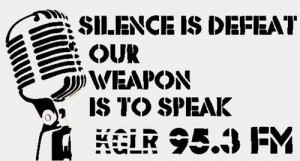 The Daily Camera reports on an unlicensed broadcaster in Boulder, Colorado that was previously little heard of outside of Boulder. Boulder was home to Boulder Free Radio, which was famous in free radio circles for playing a long-running cat-and-mouse game with the Denver FCC office, until being busted for the last time in 2005.
The Daily Camera reports on an unlicensed broadcaster in Boulder, Colorado that was previously little heard of outside of Boulder. Boulder was home to Boulder Free Radio, which was famous in free radio circles for playing a long-running cat-and-mouse game with the Denver FCC office, until being busted for the last time in 2005.
It turns out that the station, Green Light Radio, also known as KGLR, has been using BFR’s old frequency, 95.3 FM, and recently encountered some competing unlicensed activity there. KGLR co-founder Rocky Flats cites BFR as an inspiration, and even speculates that the new pirate might be someone from the BFR crew.
The article gives the impression that the station might be separating its studio from the transmitter, using a web stream as the feed, further elaborated in a sidebar offering “helpful advice” for becoming a radio pirate. This is the method that BFR used, finding sites to house its transmitters that did not easily lead back to the persons running the station or operating the feed. Rocky Flats suggests that some fans “go overboard” and rebroadcast the station’s web feed on their own. At the same time, the frequency is listed prominently on the station’s web site and he cops to learning everything he knows about pirate radio by googling it. Green Light Radio’s website features a “learn” section with some instructions on broadcasting, admittedly cribbed from the old BLR site.
The Daily Camera notes that KGLR has not yet been contacted by the FCC, and also reports that an inquiry to the Commission resulted in no comment. If KGLR wasn’t on the FCC’s radar before, I’ll bet the station is now. That doesn’t necessarily mean agents will immediately hit Boulder to sniff out the signal. But now that this fairly lengthy article is out, I wouldn’t be surprised if the Denver FCC schedules a field trip to Boulder.
The article says Green Light Radio has been on the air since 2008. That nearly five years of longevity is at least partially due to laying low. Yet, sword of publicity for an unlicensed broadcaster has two edges. On the one side, who doesn’t like to receive some relatively favorable coverage from the local newspaper. On the other side, getting your photo in the paper (even wearing a silly space helmet), makes it much more likely you’ll get tracked down.


